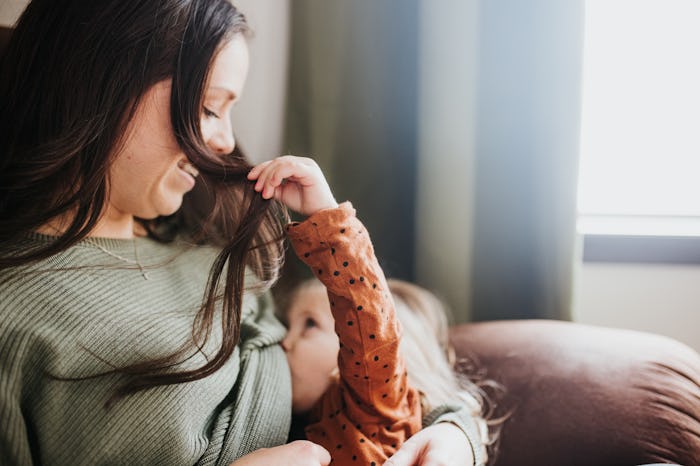Baby

I Planned To Wean My Son, But Then The Pandemic Made Breastfeeding A Lifeline
COVID-19 profoundly changed breastfeeding for me, and I know I’m not alone.
This winter, I had some free time between semesters as a Nursing PhD student to vaccinate healthcare workers in the early days of the vaccine rollout. During the consent and screening process before administering the shot, several women hesitantly disclosed that they were “still breastfeeding.” Women with babies anywhere from 9 months to 2 years old nearly whispered this information, but then, when I offered, “I’m still breastfeeding, too,” their shoulders visibly dropped and their faces opened. It seemed they had more concerns about disclosing that they were breastfeeding beyond the first 6 months than they did about getting the vaccine, which they had carefully considered. The judgment that many of us live in fear of was striking — that we’re doing it for too long, not long enough, that it’s indulgent, that we’re not giving enough.
Several women I met had extended breastfeeding because of the pandemic. One woman who had extended exclusive pumping for her daughter long after she would have quit told me: “I’ve been breastfeeding through this whole pandemic. I figured, if there are any antibodies I can give her, she’s getting them.” There is no universal breastfeeding experience. In fact, the pandemic highlighted divergent realities: 42% of women in a UK study felt that the pandemic had actually protected breastfeeding, while 27% reported struggling to get support, and stopping before they were ready. For women who had COVID-19, the terrible choice of whether to breastfeed or stop in order to isolate from their baby, was surely heartbreaking or even harmful for some, and for many, it was not a choice at all.
I experienced two emotions at once: bewilderment at what felt like the world falling apart around us, and extraordinary gratitude at being able to nurse my son.
Just before the pandemic started, I had thought I would wean my son around his second birthday. The day that we found out his day care would be closing — which is the day that, in my mind, everything changed — I brought him home and, as was our routine, nursed him on the couch. While this was usually a somewhat inconvenient but welcomed break in the activity, this time, I sat on the couch staring down at him. I experienced two emotions at once: bewilderment at what felt like the world falling apart around us, and extraordinary gratitude at being able to nurse my son. “This will protect him,” I thought to myself, and I meant both the physical and emotional closeness, and my body’s ability to produce and transfer immune cells to him in the event of exposure to the virus. As I looked down at my son nursing, a shared ritual I was preparing to say goodbye to, I realized that it needed to stay. I’m breastfeeding through this, like I’ve breastfed him through everything else. I thought it would be over by his second birthday, 6 weeks later.
One year later, my son’s third birthday approaches, and my nipples are as sore and tired as ever. In fact, he asked me the other day why they look like rectangles. When I was vaccinated, it is likely that he received immune cells as well, according to the Academy of Breastfeeding Medicine. And, if I am exposed to the virus, my body will produce immune cells to fight the virus, which will transfer to him as well. When I think about this, I am brought almost to tears with relief.
So, the nursing has continued, through pandemic waves, through exhaustion. It feeds us both.
So, the nursing has continued, through pandemic waves, through exhaustion. It feeds us both. I am held by the feeling that he will, as long as I can make milk, be able to get what he needs. The aching thing of this, besides the sorry state of my nipples, is that someday soon I will stop nursing. I cannot transmit immunity to him forever. I became a parent with my eyes wide open, but I hadn’t lived through a respiratory pandemic. I was unprepared for this level of vulnerability. For this meaning of what it is to wean my child.
This article was originally published on